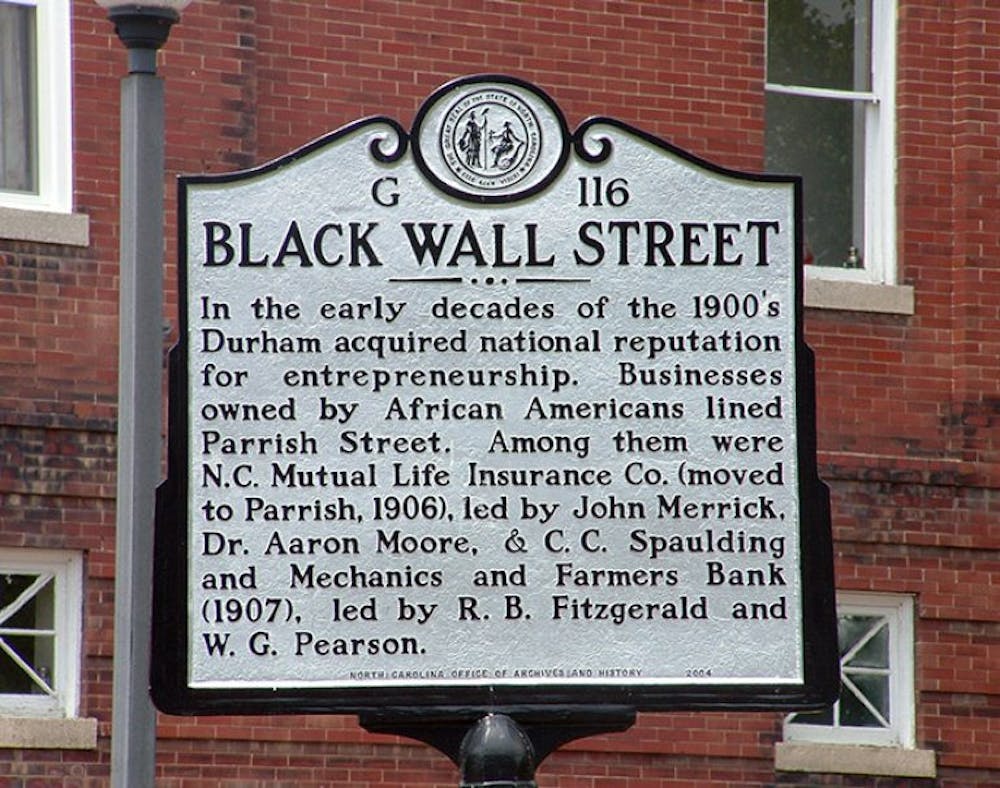Durham, North Carolina’s roots lie in its history as a beacon of diversity and economic prosperity. Following the 1898 Wilmington Massacre in which white nationalists attempted to regain control of Wilmington through the destruction of Black businesses, many Black residents retreated into Black neighborhoods. For Durham, this retreat signified the growth of Black industry. Its origins can be traced to the formation of the North Carolina Mutual Life Insurance Company and the Mechanics and Farmers Bank, among many others. Durham’s Parrish Street neighborhood soon became known as “Black Wall Street” and made Durham the “Capital of the Black Middle Class.”
This is not to claim that the neighborhoods were equal or that economic prosperity was without constant contestation. Black neighborhoods often had unpaved roads and limited access to resources. Public housing continued to be segregated. And, through the city’s “urban renewal,” the business district of Hayti was torn apart in the late 1960s by the construction of the Durham Freeway. Over 4,000 families and 500 businesses were displaced. In 1977, the freeway was expanded once more, destroying the Black Crest Street neighborhood.
Today, the COVID-19 pandemic has disproportionately impacted Black Americans. In Durham, Black women faced higher rates of housing insecurity than any other population. To mitigate these disastrous effects, around the country, activists are calling for consumers to purchase from Black-owned businesses. Black-owned businesses face more obstacles in the business sector, representing only 4.3% of the 22.2 million US businesses. As a consumer, you can begin to close the racial wealth gap by celebrating and supporting these businesses. Here are some businesses to support Black community members in Durham. You can find more to support on the Discover Durham website:
Hayti Heritage Center
In 1868, Black Episcopal Missionary and former slave Edian Markham founded St. Joseph’s AME Church. For the following decades, he preached to crowds that gathered with boxes, chairs, and stools. Eventually, in 1891, the church congregation laid the cornerstone for the founding of their new location, St. Joseph’s Church. When visiting Durham, Booker T. Washington stated, “‘Never in all my travels have I seen a church as great as St. Joseph’s.’” This church community, as the Hayti Heritage Center writes on their website, “fell victim to ‘urban renewal’” as did much of the Black arts and culture of Durham County.
Located in the historic St. Joseph’s AME Church’s original location, the Hayti Heritage Center celebrates Black culture and experiences through film, visual arts, performing arts and much more. Their mission is to preserve the historic site and the culture of Hayti. You can support by taking a class, exploring exhibits, or donating online.
Jeddah’s Tea
On their website, the founders of Jeddah’s Tea write “We aim to foster community and broaden worldviews, horizons, and palettes by shining a light on underrepresented geographies and cultures in the tea sphere. Drink to equity, understanding and appreciation.”
They certainly stand by that mission. With teas from around the world, Jeddah’s Tea creates a space of learning and cultural appreciation. They are a great spot to study and escape the cold.
Rofhiwa Book Café
Rofhiwa Book Café is an independent book store focused on celebrating Black writers. They write, “Rofhiwa strives to reflect the expansiveness of the Black imagination. We value books as repositories for collective knowledge.”
They have launch events for up-and-coming Black authors, film screenings, readings, among so much else. Their website also has a blog on topics ranging from “Black Motherhood Otherwise: A Mother’s Day Reading List from Rofhiwa” to “Let Us Read and Read Deeply.”
Saltbox Seafood Joint
Saltbox Seafood Joint was founded by Chef Ricky Moore in 2012, later expanding to a second location in 2017. Describing the restaurant’s origins, he states he “drew inspiration from the classic American fish camps and waterside seafood shacks.”
At the restaurant, you can get fried or griddled plates of fish or shellfish with slaw, potatoes, green peppers, and onions. He’s known for his Hush-Honeys, his version of a hushpuppy. Since founding the restaurant, he created a cookbook, the “Saltbox Seafood Joint Cookbook,” with K.C. Hysmith, describing how to pan-fry, grill, and much else.
In “Walter Magazine,” associate editor Addie Ladner writes, “Moore’s dedication to local seafood is at the forefront of everything he does…In recent years, he’s garnered national attention and become a face of North Carolina seafood.” This is not a restaurant you want to miss.
Get The Chronicle straight to your inbox
Signup for our weekly newsletter. Cancel at any time.

